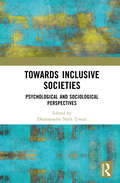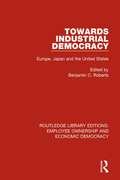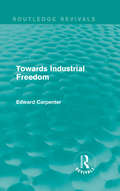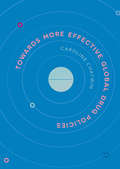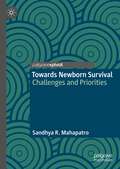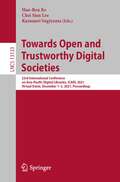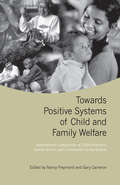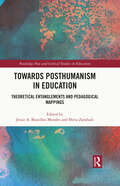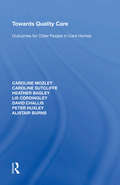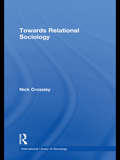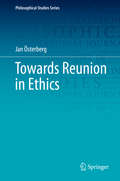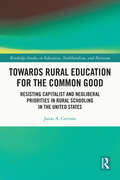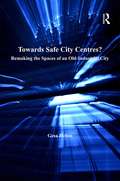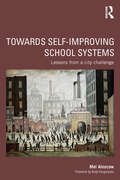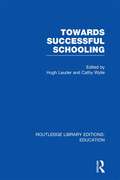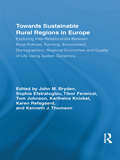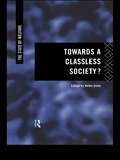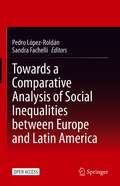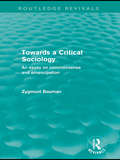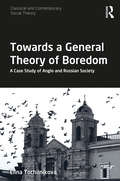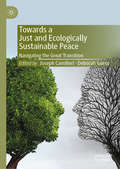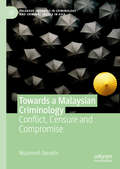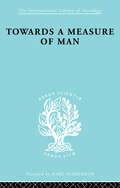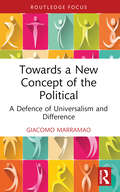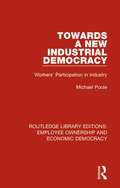- Table View
- List View
Towards Inclusive Societies: Psychological and Sociological Perspectives
by Dharmendra Nath TiwariTowards Inclusive Societies: Psychological and Sociological Perspectives focuses on the importance of building inclusive societies and communities for global human welfare within psychological, social, political, and cultural realms. It discusses the engagement of psychology and other social science disciplines on the need for building both cultural sensitivity and interdisciplinary dialogue. The volume presents the issues and consequences of globalization and diversity in the social and psychological domains and their role in shaping the physical and mental health of people. It systematically examines the various parameters of inclusivity such as equality, equity, social identity, social stigma, and coexistence of differences in socio-cultural behaviour. The volume focuses on the developments towards building inclusive societies in the South Asian countries including, India, Bangladesh, and Nepal. It also highlights the challenges and possibilities in making social-psychological discourses more inclusive. This book will be of interest to students, teachers, and scholars of psychology, cultural psychology, gender psychology, social psychology, sociology, and political science and social work. It will also be useful for psychologists, sociologists, social scientists, social workers, political scientists, and Gandhian philosophers.
Towards Industrial Democracy: Europe, Japan and the United States (Routledge Library Editions: Employee Ownership and Economic Democracy #10)
by Benjamin C. RobertsThis study, first published in 1979, analysed the international trend towards "industrial democracy" in the industrial relations practices in Europe, Japan and the United States. The development of industrial democracy was occurring through the establishment of employee and union participation on boards of directors and, at the shop floor level, in the extension of the role and power of works councils. In other countries the main development was through collective bargaining methods on labor-management relations and management decision-making. The authors examine various countries and explore any highlights, lessons and ideas that might be transferable from one political and social context to another.
Towards Industrial Freedom (Routledge Revivals: The Collected Works of Edward Carpenter)
by Edward CarpenterOriginally published in 1917 in the midst of World War I, Carpenter argues that industry in pre-war Britain was simply exploitation of labour for private gain and attempts to look toward a future with more socialist values. The papers in this study explore the negative aspects of industrial life and suggest a new outlook with which the United Kingdom can move forward in industry. This title will be of interest to students of sociology.
Towards More Effective Global Drug Policies
by Caroline ChatwinThis book examines the topical issue of global drug policy and outlines five steps that could be taken to improve its effectiveness. A public criminology approach is applied to explore not only what could be done, but also why it matters and how it could be achieved. It argues that more effective global drug policies require an acknowledgement of the failure of a war on drugs approach and the harms it has caused. Instead, strategies that reduce drug related harm should be prioritised. An innovative and diverse range of approaches should be developed that are underpinned by evaluation and dissemination of results. Finally, the horizons of the drug policy debate should be broadened. In line with the central aims of public criminology, this book provides an accessible contribution to global drug policy debates that links theory and practice and which will have appeal to a wide range of audiences.
Towards Newborn Survival: Challenges and Priorities
by Sandhya R. MahapatroThis book offers a comprehensive study of the complexities of newborn survival in resource-poor regions, using the state of Bihar (India) as a case study. It provides important lessons for other low-performing countries, in similar socioeconomic contexts, where newborn survival is a major challenge.The volume opens with a brief account of the trends and regional variations in neonatal mortality. The empirical verification of socio-cultural, economic and health system barriers and the state interventions that affect newborn survival are subsequently explored. Innovative strategies are then proposed to scale up maternal newborn and child health (MNCH) services and improve neonatal health outcomes. Addressing this issue through appropriate policy action is essential to achieving Sustainable Development Goal-3, "Good Health and Well-being". This book will therefore appeal to public health scholars, professionals and policymakers interested in improving outcomes in low-income regions.
Towards Open and Trustworthy Digital Societies: 23rd International Conference on Asia-Pacific Digital Libraries, ICADL 2021, Virtual Event, December 1–3, 2021, Proceedings (Lecture Notes in Computer Science #13133)
by Hao-Ren Ke Chei Sian Lee Kazunari SugiyamaThis book constitutes the refereed proceedings of the 23rd International Conference on Asia-Pacific Digital Libraries, ICADL 2021, which was held in December 2021. Due to COVID-19 pandemic the conference was held virtually.The 17 full, 14 short, and 5 practice papers presented in this volume were carefully reviewed and selected from 87 submissions. The papers were organized in topical sections named: Knowledge Discovery from Digital Collections; Search for Better User Experience; Information Extraction; Multimedia; Text Classification and Matching; Data Infrastructure for Digital Libraries; Data Modeling; Neural-based Learning.
Towards Positive Systems of Child and Family Welfare: International Comparisons of Child Protection, Family Service, and Community Caring Systems
by Gary Cameron Nancy FreymondThe need for services that respond to the ‘maltreatment’ of children and to the struggles of families is at the core of social service systems in all developed nations. While these child and family welfare systems confront similar problems and incorporate common elements, there are substantial differences in philosophy, organization, and operation across international settings and models.In this new collection of essays, Nancy Freymond and Gary Cameron have brought together some of the finest international minds to provide an original and integrated discussion of child protection, family service, and community caring models of child and family welfare. The volume not only examines child protection and family service approaches within Western nations – including Canada, the United States, England, the Netherlands, France, and Sweden – it is also the first comparative study to give equal attention to Aboriginal community caring models in Canada and New Zealand.The comparisons made by the essays in this volume allow for a consideration of constructive and feasible innovations in child and family welfare and contribute to an enriched debate around each system. This book will be of great benefit to the field for many years to come.
Towards Posthumanism in Education: Theoretical Entanglements and Pedagogical Mappings (Routledge New and Critical Studies in Education)
by Jessie A. Bustillos Morales Shiva ZarabadiThis edited volume presents a post-humanist reflection on education, mapping the complex transdisciplinary pedagogy and theoretical research while also addressing questions related to marginalised voices, colonial discourses, and the relationship between theory and practice.Exhibiting a re-imagination of education through themed relationalities that can transverse education, this cutting-edge book highlights the importance of matter in educational environments, enriching pedagogies, teacher-student relationships and curricular innovation. Chapters present contributions that explore education through various international contexts and educational sectors, unravelling educational implications with reference to the climate change crisis, migrant children in education, post-pandemic education, feminist activists and other emergent issues. The book examines the ongoing iterations of the entanglement of colonisation, modernity, and humanity with education to propose a possibility of education capable of upholding heterogeneous worlds.Curated with a global perspective on transversal relationalities and offering a unique outlook on posthuman thoughts and actions related to education, this book will be an important reading for students, researchers and academics in the fields of philosophy of education, sociology of education, posthumanism and new materialism, curriculum studies, and educational research.
Towards Quality Care: Outcomes for Older People in Care Homes (In Association With Pssru (personal Social Services Research Unit) Ser.)
by Alistair Burns David Challis Caroline Sutcliffe Caroline Mozley Peter Huxley Heather Bagley Lis CordingleyThis unique evaluation of the outcomes of residential and nursing home care for older people identifies the factors determining the quality of life of older people who have moved into care homes. It examines the relationship between older people's psychological well-being and the kinds of care received in residential homes. The volume draws on a study of UK care homes, interviewing new entrants soon after admission and then on two further occasions, to ascertain their experience of care and their quality of life. Interviews were also undertaken with care staff and their managers, and the care environment of each home was assessed. The authors provide valuable evidence of the factors which can influence older people's well-being on entering a care home and how they adjust either positively or not to their new surroundings. The volume offers clear pointers towards ways to improve quality of residential and nursing home care.
Towards Relational Sociology (International Library of Sociology)
by Nick CrossleyTowards Relational Sociology argues that social worlds comprise networks of interaction and relations. Crossley asserts that relations are lived trajectories of iterated interaction, built up through a history of interaction, but also entailing anticipation of future interaction. In addition, he demonstrates how networks comprise multiple dyadic relations which are mutually transformed through their combination. On this conceptual basis he builds a relational foundation for sociology. Over the course of the book, three central sociological dichotomies are addressed - individualism/holism, structure/agency and micro/macro – and utilised as a foil against which to construct the case for relational sociology. Through this, Crossley is able to argue that neither individuals nor ‘wholes’ - in the traditional sociological sense - should take precedence in sociology. Rather sociologists should focus upon evolving and dynamic networks of interaction and relations. The book covers many of the key concepts and concerns of contemporary sociology, including identity, power, exchange and meaning. As such it is an invaluable reference tool for postgraduate students and researchers alike.
Towards Reunion in Ethics (Philosophical Studies Series #138)
by Jan ÖsterbergThis posthumous publication attempts to answer the question of what moral code is the most reasonable. Philosophers often turn to consequentialism or deontological ethics to address this issue. As the author points out, each has valid arguments but each is unable to get the other side to agree. To rectify this, he proposes a third way. Inside, readers will discover a theory that tries to do justice to both sides. The author first details consequentialism and deontological ethics. He also explains their fundamental conflict. One holds the view that you should do what has the best consequences. The other believes that there are actions which are wrong to do even if they have the best consequences. Next, the volume considers various ways to solve this conflict. Would rejecting one theory work? Or, is it possible to somehow reconcile them. The author shows why these solutions fail. He then goes on to present his own. The resulting contractual theory brings together the two opposing ethical convictions. It proposes that what is right and wrong depends on what norms people would agree to. Throughout, coverage explores the psychological, sociological, and historical background of the moral theories discussed. The reason is that moral theories are embedded in social and psychological contexts. They are better understood when the contexts are explicit. This key feature distinguishes the volume from other works in moral philosophy.At the time of his death in July 2011, Jan Österberg was close to completing this manuscript. It was taken up and fully completed by Erik Carlson and Ryszard Sliwinski, both of Uppsala University.
Towards Rural Education for the Common Good: Resisting Capitalist and Neoliberal Priorities in Rural Schooling in the United States (Routledge Studies in Education, Neoliberalism, and Marxism)
by Jason A. CervoneThis book examines the current and future state of rural education in North America through the lens of Franco Berardi’s Futurability. Through critical examination of examples and current trends toward corporatization and privatization of rural education, the volume highlights how future possibilities and social imagination in rural spaces have been limited by neoliberal forces, capitalist interests, and workforce education. Cervone demonstrates how Berardi’s concept of creating future can be embraced to foster critical thought, challenge injustices, and open opportunity. With this line of analysis, the book ultimately supports an ethos of a return to education for the common good. Bringing an important perspective to the field of rural education scholarship, this work will be of interest to scholars and researchers in sociology of education and education policy.
Towards Safe City Centres?: Remaking the Spaces of an Old-Industrial City (Re-materialising Cultural Geography Ser.)
by Gesa HelmsExamining the rising interest in quality-of-life offences, anti-social behaviour and incivilities in urban public spaces, this study explores the rising importance of policing, crime control and community safety policies in the context of the ongoing urban restructuring in old-industrial cities. This is achieved through an extensive exploration into the making and remaking of urban spaces in the city of Glasgow. In so doing, this book puts forward a strong and innovative theoretical argument. Framed in a critical Marxist perspective that draws on debates within German-speaking critical theory and Marxism, this study argues for the centrality of human social praxis in our understanding of contemporary cities. It engages with questions over the production of social space, a (fragmented) social totality and human agency, which so far have only received limited attention in Anglo-American debates.
Towards Self-improving School Systems: Lessons from a city challenge
by Mel AinscowThis important new book draws lessons from a large-scale initiative to bring about the improvement of an urban education system. Written from an insider perspective by an internationally recognized researcher, it presents a new way of thinking about system change. This builds on the idea that there are untapped resources within schools and the communities they serve that can be mobilized in order to transform schools from places that do well for some children so that they can do well for many more. Towards Self-improving School Systems presents a strategic framework that can help to foster new, more fruitful working relationships: between national and local government; within and between schools; and between schools and their local communities. What is distinctive in the approach is that this is mainly led from within schools, with senior staff having a central role as system leaders. The book will be relevant to a wide range of readers throughout the world who are concerned with the strengthening of their national educational systems, including teachers, school leaders, policy makers and researchers. The argument it presents is particularly important for the growing number of countries where increased emphasis on school autonomy, competition and choice is leading to fragmentation within education provision. Foreword by Andy Hargreaves, Thomas More Brennan Chair in Education, Boston College, USA
Towards Successful Schooling (Routledge Library Editions: Education)
by Cathy Wylie Hugh LauderThe editors have compiled this critical and comparative study of changes which took place in the New Zealand education system in the second half of the twentieth century. For other Western societies who have felt the impact of New Right policies the New Zealand case is interesting because it provides some indication of how policies of decentralization in education might be used to develop egalitarian and democratic educational policies. In recent years there have been major changes to educational systems in the Western world. Often these changes have been justified by reference to successful educational practices in other countries. However, it is not always possible simply to abstract educational practices from one context and apply them in another successfully. Moreover claims that policies in one country are more successful than those in another have to be treated cautiously: there are always problems in making valid comparisons between the educational performances of different countries. It is important, therefore, that critical and comparative studies are made of educational systems which take full account of the contexts in which they are embedded.
Towards Sustainable Rural Regions in Europe: Exploring Inter-Relationships Between Rural Policies, Farming, Environment, Demographics, Regional Economies and Quality of Life Using System Dynamics (Routledge Studies in Development and Society)
by Tom Johnson John M. Bryden Sophia Efstratoglou Tibor Ferenczi Karlheinz Knickel Karen Refsgaard Kenneth J. ThomsonThis book presents the methodology and results of a three-year, eleven-country science-to-policy research project – Toward a Policy Model of Multifunctional Agriculture and Rural Development – undertaken between 2005 and 2008 and financed under the European Union's Sixth Framework program. It deals with an important contemporary policy issue: how best to ensure that an agriculturally-based policy can contribute to the development of rural regions. It tackles this problem in a number of different but complementary ways, primarily by the development of a unique and innovative dynamic systems model, POMMARD (a Policy Model of Multifunctional Agriculture and Rural Development).
Towards a Classless Society? (The\state Of Welfare Ser.)
by Helen JonesAn alternative to the right-wing paradigm which has hijacked discussions of class, this book focuses on the specific ways in which class inequalities manifest themselves in Britain and exposes the hollowness if politicians' rhetoric over the classless society.
Towards a Comparative Analysis of Social Inequalities between Europe and Latin America
by Pedro López-Roldán Sandra FachelliThis open access volume identifies the common and specific aspects of social mechanisms that generate inequalities, through comparative analyses of different dimensions in which inequalities are expressed. It includes studies on social inequalities in 5 European and 5 Latin American countries, along 11 thematic axes: inequalities in the labour market and labour trajectories; asymmetries in the relationship between training and employment; inequalities in work and family life; educational inequalities; geographical and social inequalities: ethnicity and language; social inequalities, migration and space; uncertainty, strategies, resources and capabilities; inequality of opportunity: intergenerational social mobility; social policies; gender inequalities; and research methodology. This volume is the result of a large collaborative project on social inequality funded by the European Commission: the International Network for Comparative Analysis of Social Inequalities. Taking into account diverse perspectives and approximations, the collaborators have created a general analytical framework as a model of analysis of social inequalities. The various contributions in this volume help readers gain a global outlook and help reflect on social inequalities in a comparative perspective. This volume addresses social science graduate and postgraduate students, researchers, social policy makers, as well as a broader academic audience interested in social inequality.
Towards a Critical Sociology: An Essay on Commonsense and Imagination (Routledge Revivals)
by Zygmunt BaumanFor the better part of its history sociology shared with commonsense its assumption of the ‘nature-like’ character of society – and consequently developed as the science of unfreedom. In this powerful and engaging work, first published in 1976, Professor Bauman outlines the historical roots of such a science and describes how the new trends in sociology emerging from phenomenology and existentialism do not challenge this preoccupation. Rather, he claims, they deepen and extend it by stressing the key role of commonsense, particularly the ways in which it is sustained and embedded in the routines and assumptions of everyday life. Professor Bauman sets out the form of a critical sociology, based on emancipatory reason. His main concerns are the `validity' of commonsense and the truth of a theory which would resolve to transcend the limitations of commonsensical evidence. Aimed at human liberation A Critical Sociology is designed to question the very same routines and assumptions of everyday life informed by commonsense.
Towards a General Theory of Boredom: A Case Study of Anglo and Russian Society (Classical and Contemporary Social Theory)
by Elina TochilnikovaThrough comparative historical research, this book offers a novel theory explaining the emergence of boredom in modernity. Presenting a Durkheimian topology of cross-cultural boredom, it grounds the sociological cause of boredom in anomie and the perception of time, compares its development through case studies in Anglo and Russian society, and explains its minimal presence outside of the West. By way of illustrative examples, it includes archetypes of boredom in literature, art, film, and music, with a focus on the death of traditional art, and boredom in politics, including strategies enacted by Queer intellectuals. The author argues that boredom often results from the absence of a strong commitment to engaging with society, and extends Durkheim’s theory of suicide to boredom in order to consider whether an imbalance between social regulation and integration results in boredom. The first book to scientifically explain the historical emergence and epidemic of boredom while engaging with cutting edge political debates, Towards a General Theory of Boredom will appeal to scholars across the social sciences with interests in social theory, social psychology, and sociology.
Towards a Just and Ecologically Sustainable Peace: Navigating the Great Transition
by Deborah Guess Joseph CamilleriThis book addresses the need to develop a holistic approach to countering violence that integrates notions of peace, justice and care of the Earth. It is unique in that it does not stop with the move toward articulating ‘Just Peace’ as a human concern but probes the mindset needed for the shift to a ‘Just and Ecologically Sustainable Peace’. It explores the values and principles that can guide this shift, theoretically and in practice. International in scope and grounded in the reality of Indigenous and non-Indigenous Australia and the wider Asia-Pacific context, the book brings together important insights drawn from the Indigenous relationship to land, ecological feminism, ecological philosophy, the social sciences more generally, and a range of religious and non-religious cosmologies. Drawn from diverse disciplinary backgrounds, the contributors in this book apply their combined professional expertise and active engagement to illuminate the difficult choices that lie ahead.
Towards a Malaysian Criminology: Conflict, Censure and Compromise (Palgrave Advances in Criminology and Criminal Justice in Asia)
by Muzammil QuraishiThis book provides a critical analysis of criminological scholarship in Malaysia, presenting a focused exploration of the key qualities and limitations to studies on crime, deviance, victimization and criminal justice in this country. This text connects contemporary crime problems with historical legacies such as the impact of colonialism and the influence of ethno-nationalism and authoritarianism in the region. Conflict and tension created by legal pluralism is illustrated via three case studies exploring apostasy, Islamic rehabilitation centres, and retention and use of the death penalty. In addition to a critique of contemporary Malaysian criminological scholarship, Towards a Malaysian Criminology suggests a composite, critical criminological approach to guide future research. This approach draws on theoretical traditions in critical race theory, critical realism, ultra-realism and the emerging field of Islamic critical realism. Given the multidisciplinary nature of the discipline, this text will appeal to scholars of criminology, sociology, law, politics and Islamic theology.
Towards a Measure of Man: The Frontiers of Normal Adjustment (International Library of Sociology)
by Paul HalmosFirst Published in 1998. Routledge is an imprint of Taylor & Francis, an informa company.
Towards a New Concept of the Political: A Defence of Universalism and Difference (Critiques and Alternatives to Capitalism)
by Giacomo MarramaoThis book addresses the current crisis of democratic politics and its phase of ‘interregnum’ – in which the past finds it hard to die and the future finds it difficult to be born – by proposing a radical redefinition of the concept of the Political. Drawing on the thoughts of Antonio Gramsci and Walter Benjamin among others, it explores the meaning of the lemma auctoritas – the opposition between authority and power – and offers a comparison of the Frankfurt School’s radical critique of power with Georges Bataille’s critique of political economy and consumerist productivism, demonstrating how the two ultimately converge. Based on an ontology of the present that is critical of ‘identity obsession’ and advances instead a universalism of difference, the author proposes a new understanding of politics founded not on ‘vertical’ domination but on a ‘horizontal’ recomposition of subjectivities, allowing interaction and acting-in-common between different forms of life. This book will therefore appeal to scholars of social and political theory.
Towards a New Industrial Democracy: Workers' Participation in Industry (Routledge Library Editions: Employee Ownership and Economic Democracy #8)
by Michael PooleThis title, originally published in 1986, explores the political and economic conditions of the 1980s, and reflects the world-wide interest in industrial democracy. Each chapter analyses the main adaptations in policy, theory and experimentation that have occurred in industrial democracy in the 1980s. In particular, the role of managers is examined in depth and detail, since these personnel have been responsible for a number of recent initiatives. The themes covered are vital for all those seeking new directions in the reform of modern industrial relations in the late 1980s and into the 1990s.
